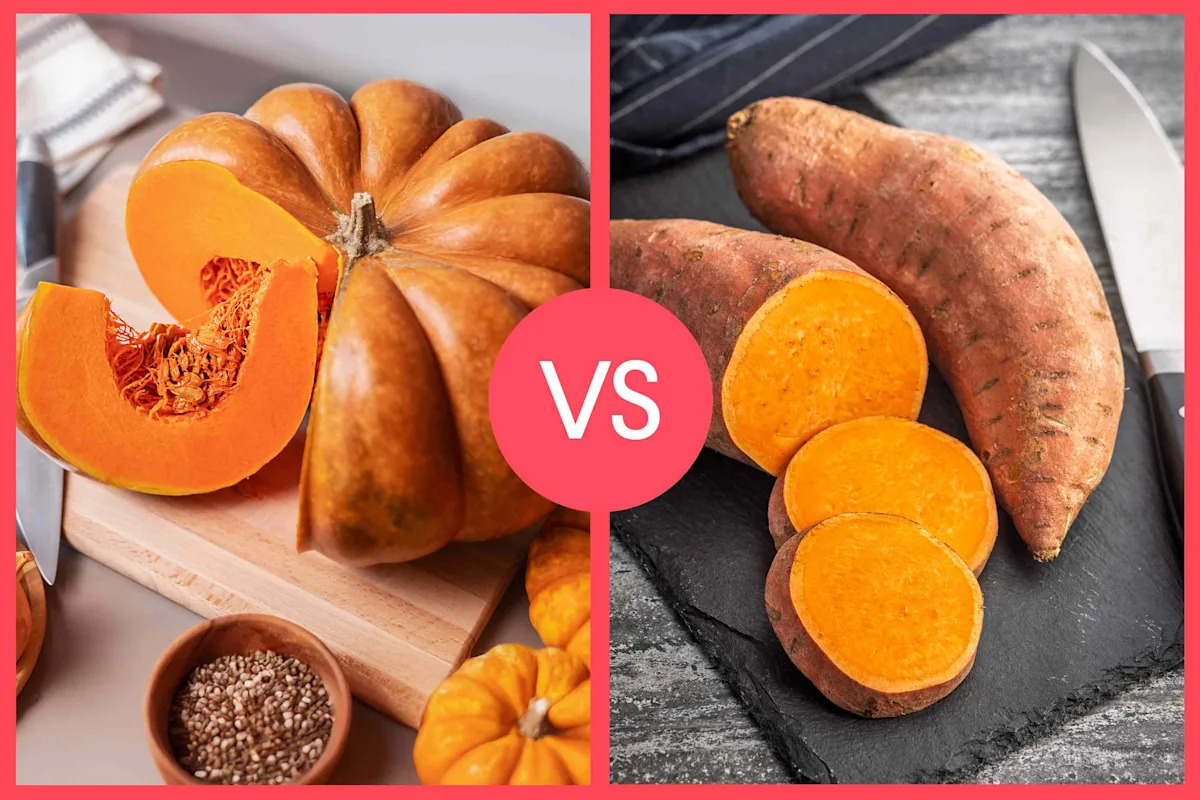Key Takeaways
Both pumpkin and sweet potato are nutritional powerhouses. Pumpkin is lower in calories and carbs, while sweet potatoes deliver more fiber, potassium, and beta-carotene.
Pumpkin supports hydration and immune health. Its high water content and antioxidants make it great for feeling full and boosting your body’s defenses.
Sweet potatoes edge ahead in nutrients. With extra fiber, vitamin C, and potassium, they offer long-lasting energy and added benefits for heart and gut health, ultimately making it the healthier option.
When it comes to fall vegetables, pumpkin and sweet potatoes reign supreme. They’re both versatile, and delicious when roasted and tossed into soups, stews, salads, and pies. Once you cut them open, they’re similar in color. “From a culinary perspective sweet potatoes and pumpkin have very similar flavor profiles and pair with similar types of foods and spices,” says Elizabeth Huggins, RDN, LD, registered dietitian nutritionist at Hilton Head Health Wellness Resort & Spa.
But when it comes to nutrition, is pumpkin or sweet potato healthier? We spoke with several dietitians and nutritionists to find out the health benefits and nutritional breakdown of both veggies.
Health Benefits of Pumpkins
When you think of pumpkin, delicious Thanksgiving pies probably come to mind first. But don’t stop there—there are plenty of other (healthier) dishes you can make with the gourd. And with health benefits like these, you’ll soon see why.
Supports Eye and Skin Health
Pumpkins contain both Vitamin A and beta-carotene, which “are essential for healthy vision and help maintain the retina and reduce the risk and progression of age-related eye conditions,” Huggins says. They’re also rich in antioxidants like lutein and zeaxanthin, which protect eye health, says Martha Theran, RDN, registered dietitian and educator at Pritikin Longevity Center. In addition, vitamin A and beta-carotene are good for your skin, she notes.
Keeps You Satiated and Hydrated
Because pumpkin has a high water content, it helps with satiety and hydration without adding many calories, Theran says. “Pumpkin is notably lower in carbohydrate and calories compared to an equal portion of sweet potatoes,” Huggins adds. “One of the things I love about pumpkin is that it’s incredibly nutrient-dense for such a low-calorie food. One cup has only about 30 calories but over 200% of your daily vitamin A needs.”
Supports Your Immune System
The Vitamin A and C in pumpkin play an important role in supporting immune function, Huggins says. But wait, there’s more: according to lifestyle medicine physician Dr. Maria Knobel, MD, pumpkin contains 20-plus carotenoid compounds of pumpkin, which also boost your immune system. “The concentration of alpha-carotene is three times that of carrots, producing excellent protection of the cell,” she says.
Health Benefits of Sweet Potato
“Sweet potatoes are a powerhouse of nutrition,” Theran says. Because they have a similar nutritional profile to pumpkin, sweet potatoes also offer many of the same health benefits—like supporting eye and skin health and the immune system. They’re also extremely versatile, substituting for regular potatoes in many meals. Here are some reasons why you might want to consider making the switch.
Aids in Digestion
While pumpkins and sweet potatoes both contain fiber, sweet potatoes have roughly four times as much of the carbohydrate, making it great for digestion. “Fiber is critical for regular bowel movements, and the combination of fiber, antioxidants, and phytonutrients helps support overall digestive health and healthy gut microbiota,” Huggins says. Fiber also helps with blood sugar regulation, Theran says. A medium sweet potato provides about 4 grams of fiber and the full daily requirement for vitamin A, she adds.
Supports Cardiovascular Health
Sweet potatoes are a good source of potassium, magnesium, and fiber, which can help to regulate blood pressure and promote cardiovascular health, Huggins says. For example, increased potassium may help prevent hardening of the arteries, which contributes to serious cardiovascular conditions, while consuming foods rich in magnesium may help to regulate blood pressure.
Promotes Brain Health
The vitamin B6 in sweet potatoes helps support brain health, Theran says. According to the Mayo Clinic, vitamin B6 “is important for normal brain development and for keeping the nervous system and immune system healthy.” That’s because of its role in making neurotransmitters, the Cleveland Clinic notes. Additionally, a deficiency of vitamins B6 has been associated with reduced brain function.
Which Is Healthier: Pumpkin or Sweet Potatoes?
So, which fall favorite veggie is healthier? “I wouldn’t say one is healthier than the other—they each have unique strengths,” Theran says. “Pumpkin is lower in calories and carbohydrates, which can be especially helpful for weight and blood sugar control. Sweet potatoes bring more fiber and complex carbs, which means they’re great for long-lasting energy and digestive health.”
According to Dr. Julie Pollock, PhD, biochemist and chemistry professor at the University of Richmond, sweet potatoes are higher in calories than pumpkins because they contain more carbohydrates—starch and fiber—as well as protein.
But the calorie count of sweet potatoes shouldn’t be a dealbreaker. “The carbohydrate and calorie differences are not necessarily a good or bad thing, but simply differences to be aware of when it comes to your portion size, and how that impacts weight and blood sugar management,” Huggins says. And while sweet potatoes are higher in calories, they also have more vitamins, Pollock says. Because of this, sweet potatoes may have the advantage.
“[Pumpkins and sweet potatoes] are both great sources of vitamin A, antioxidants, fiber, and complex carbs that provide a source of steady energy,” says Carolina Schneider, RD, registered dietitian and nutrition advisor at Daily Harvest. “However, sweet potatoes do come out slightly ahead as they pack higher amounts of certain nutrients like vitamin C and potassium when compared to pumpkin.”
Read the original article on Real Simple

